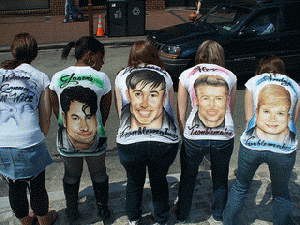my crazy friends & I by melissaellis27
I just keep trying to understand why we have such differing collective opinions about what seems to be so obvious to each of us individually. For instance, why do we see the supposed exact same event and argue about what happened?
I once staged a confrontation between two people in a class that I was teaching. I then asked the 30 people in the room to describe what had happened. We spent the next hour debating the issue. About the only thing we could reach consensus on was that these two people were there. I had made my point: We don't believe what we see, we see what we believe. And this is a dangerous phenomenon today. Why do I make this statement? Here's why.
Carl Jung, the post-Freudian psychiatrist, wrote about how people who are successfully adjusted to normal social standards can still be suffering. He said, "I have frequently seen people become neurotic when they content themselves with inadequate or wrong answers to the questions of life".our world is, so to speak, dissociated like a neurotic" In other words, if we are well-adjusted to a crazy world, then what are we?
Here's the scary part; we don't know it. And when a person comes along and proposes something different, he seems like the nutcase. We will have temper tantrums before we will allow our illusions to be confronted. We will put our hearts and souls into fighting for our point of view, even if it's just plain nutty.
To quote Henry de Montherlant, "Stupidity does not consist in being without ideas"human stupidity consists in having lots of ideas, but stupid ones." Let's see:
Bring your guns (symbols of violence) to church (place of peace). Add more violence to curb violence. Vote for the candidate who runs the most malicious attack ads. Declare war on every social ill in your society. Reduce funding for the education of the children who are the future of the country. Build more tanks and airplanes even though we already have more military equipment than the next 12 countries combined. Remove barriers to special interest influences in our elections while the electorate is clamoring for more controls. Gerrymander voting districts to distort the results of elections.
I happen to think that these are just plain "stupid ideas". But I'm sure there are those who will argue in their favor. Here's the problem; We have too many people with stupid ideas arguing with other people about their stupid ideas.
And we call it freedom of expression. I know, by now you think I'm an intellectual elitist. Too bad, because I'm simply arguing for the injection of rational thinking into our public discourse. And you don't have to be an intellectual or elitist to think rationally.
But as we've learned from our recent economic collapse the whole concept of the "rational actor" in economic theory, first described by Adam Smith, is just not true. People cannot be expected to act, of for that matter, think rationally. We are influenced, nudged, convinced by all kinds of other factors that we aren't aware of at a conscious level. But that said, we often think that these nutty ideas are our own. Well, some are not. Many come from a crazy world.
In order to think rationally, we need to question our own positions before we begin using our freedom to express ourselves. How many of us can really justify our ideas on solid grounding. I don't mean use a quote from some bloviator to prove our point? I mean really think about whether our point of view makes sense in the larger context.
Until we begin to do this, we will drown in stupid ideas. And please don't think I'm just criticizing others, I have a few stupid ideas of my own.
By the way, did you read about the guy who set his car on fire and then stabbed himself to get even with his insurance company for not paying a previous claim that he had filed. He died. I rest my case.
Robert DeFilippis
(Note: You can view every article as one long page if you sign up as an Advocate Member, or higher).






